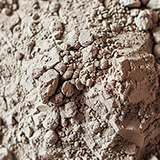

Blast furnace slag is a kind of fine particles mainly made of glass, light yellow, glass luster or silk luster, mostly crystalline block, honeycomb or rod. It is the molten matter produced in the steel-making process that takes silicate and aluminosilicate as the main components, floats on the surface of the molten iron, and is regularly discharged from the blast furnace slag discharge port, and is formed by the rapid cooling of air or water. In recent years, with the in-depth research on the performance of slag at home and abroad, the slag is separately ground to a certain fineness, and the specific surface area reaches 400m2/kg or more, its activity can be fully exerted, and it is more widely used. Slag is milled slag, also known as slag powder.
The limestone is fed into the bucket elevator and subsequently transported to the raw material warehouse for grinding.
After grinding, the finished products are gathered by powder concentrator, and then conveyed to a screw conveyor.
The finished products are transported to the storage warehouse, while the excess gas is filtered by the dust collector.
The whole system is equipped with three pulse dust collectors to guarantee that the whole system is free of dust leakage.
The system is outfitted with an intelligent PLC control cabinet and an upper computer.
The system is equipped with an intelligent PLC control cabinet and an upper computer.
When the slag is ground to a specific surface area of 400 m2/kg or more, it can be mixed into ordinary cement according to a certain ratio to increase the cement strength by 5MPa-8MPa. Slag powder can prevent the whitening of the surface of concrete and its products while improving the strength of concrete.

The slag micropowder plays a micro-filling role in concrete and its products. At the same time, the active component Al2O3 in the slag micropowder and Ca (OH) 2, SO3 in cement form calcium vanadite. It can compensate the chemical shrinkage of the product, thereby improving the compactness and impermeability of the product.

Since the activity of the slag powder needs to be reduced, it has good alkali absorption capacity. For Portland cement, it can absorb alkali metal elements such as K and Na, inhibit alkali aggregate reaction, and improve the moisture resistance and waterproof performance of products.

As the concentration of Ca (OH) 2, K2O and Na2O in cement and concrete added with slag powder is reduced, the compactness and impermeability are improved, and the alkali aggregate reaction can be effectively suppressed. In addition, the addition of slag powder in concrete can reduce the heat of hydration, thereby greatly improving the durability of cement, concrete and its products.

If you would like to receive personalized solutions and a free quote, kindly provide your information below.